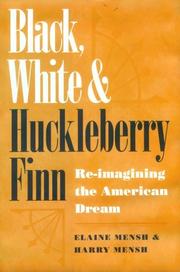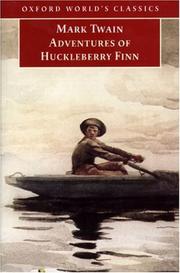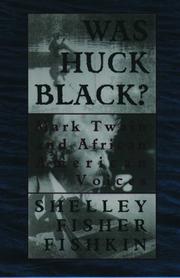| Listing 1 - 3 of 3 |
Sort by
|

ISBN: 0585300607 9780585300603 9780817309954 0817309950 9780817311308 0817311300 9780817313517 0817313516 0817309950 9780585300607 9780817309950 Year: 2000 Publisher: Tuscaloosa, Ala University of Alabama Press
Abstract | Keywords | Export | Availability | Bookmark
 Loading...
Loading...Choose an application
- Reference Manager
- EndNote
- RefWorks (Direct export to RefWorks)
This consequential book takes a hard, systematic look at the depiction of blacks, whites, and race relations in Mark Twain's classic novel, raising questions about its canonical status in American literature. Huckleberry Finn, one of the most widely taught novels in American literature, has long been the subject of ongoing debates over issues ranging from immorality to racism. Here, Elaine Mensh and Harry Mensh enter the debate with a careful and thoughtful examination of racial messages imbedded in the tale of Huck and Jim. Using as a gauge
Adventure stories, American -- History and criticism. --- African Americans in literature. --- Fugitive slaves in literature. --- Literature and society -- United States -- History -- 19th century. --- National characteristics, American, in literature. --- Race relations in literature. --- Twain, Mark, -- 1835-1910 -- Political and social views. --- Twain, Mark, -- 1835-1910. -- Adventures of Huckleberry Finn. --- Literature and society --- Adventure stories, American --- National characteristics, American, in literature --- African Americans in literature --- Fugitive slaves in literature --- Race relations in literature --- English --- Languages & Literatures --- American Literature --- Afro-Americans in literature --- Negroes in literature --- History --- History and criticism --- Twain, Mark --- Twain, Mark, --- Finn, Huckleberry --- Finn, Huck --- History and criticism.

ISBN: 0191605050 0191560502 0585363447 9780191560507 9780585363448 9780191605055 0192824414 9780192824417 9780199536559 0199536554 0191920703 Year: 1999 Publisher: Oxford New York Oxford University Press
Abstract | Keywords | Export | Availability | Bookmark
 Loading...
Loading...Choose an application
- Reference Manager
- EndNote
- RefWorks (Direct export to RefWorks)
The story of Huck's escape from his brutal father and the relationship that grows between him and Jim, a slave fleeing an even more brutal oppression, proved enormously influential in the development of American literature.
Finn, Huckleberry (Fictitious character) --- Runaway children --- Male friendship --- Fugitive slaves --- Race relations --- Boys --- Mississippi River --- Missouri --- Finn, Huckleberry --- Finn, Huck --- Twain, Mark, --- Mississippi --- State of Mississippi --- Missisipi --- Місісіпі --- Misisipi --- Штат Місісіпі --- Shtat Misisipi --- Мисисипи --- Щат Мисисипи --- Mísísípii Hahoodzo --- Mississippi osariik --- Μισισιπι --- Πολιτεία του Μισισίπι --- Politeia tou Misisipi --- Estado de Misisipi --- Misisipio --- État du Mississippi --- Mississippy --- 미시시피 주 --- Misisipʻi-ju --- 미시시피 --- Mikikipi --- מיסיסיפי --- מדינת מיסיסיפי --- Medinat Misisipi --- US-MS --- MS (State : Mississippi) --- MI (State : Mississippi) --- Miss. --- Social life and customs

ISBN: 0195089146 0195082141 9780195082142 Year: 1993 Publisher: New York Oxford Oxford University Press
Abstract | Keywords | Export | Availability | Bookmark
 Loading...
Loading...Choose an application
- Reference Manager
- EndNote
- RefWorks (Direct export to RefWorks)
Published in 1884, Huckberry Finn has become one of the most widely taught novels in American curricula. But where did it come from, and what made it so distinctive? Shelly Fisher Fishkin suggests that in Huckleberry Finn, more than in any other work, Mark Twain let African-American voices, language, and rhetorical traditions play a major role in the creation of his art. In Was Huck Black?, Fishkin combines close readings of published and unpublished writing by Twain with intensive biographical and historical research and insights gleaned from linguistics, literary theory, and folklore to shed new light on the role African-American voices played in the genesis of Huckleberry Finn. Given that book's importance in American culture, her analysis illuminates, as well, how African-American voices have shaped our sense of what is distinctively "American" about American literature. Fishkin shows that Mark Twain was surrounded, throughout his life, by richly talented African-American speakers whose rhetorical gifts Twain admired candidly and profusely. A black child named Jimmy whom Twain called "the most art-less, sociable, and exhaustless talker I ever came across" helped Twain understand the potential of a vernacular narrator in the years before he began writing Huckberry Finn, and served as a model for the voice with which Twain would transform American literature. A slave named Jerry whom Twain referred to as an "impudent and satirical and delightful young black man" taught Twain about "signifying"--Satire in an African-American vein - when Twain was a teenager (later Twain would recall that he thought him "the greatest man in the United States" at the time). Other African-American voices left their mark on Twain's imagination as well - but their role in the creation of his art has never been recognized. Was Huck Black? adds a new dimension to current debates over multiculturalism and the canon. American literary historians have told a largely segregated story: white writers come from white literary ancestors, black writers from black ones. The truth is more complicated and more interesting. While African-American culture shaped Huckleberry Finn, that novel, in turn, helped shape African-American writing in the twentieth century. As Ralph Ellison commented in an interview with Fishkin, Twain "made it possible for many of us to find our own voices." Was Huck Black? dramatizes the crucial role of black voices in Twain's art, and takes the first steps beyond traditional cultural boundaries to unveil an American literary heritage that is infinitely richer and more complex than we had thought.
Afro-Americans --- -Afro-Americans in literature --- Authors, American --- -American authors --- Afro-Americans in literature --- Negroes in literature --- African Americans --- Black Americans --- Colored people (United States) --- Negroes --- Africans --- Ethnology --- Blacks --- Biography --- Twain, Mark --- -Twain, Mark --- -Clemens, Samuel Langhorne --- Characters --- -Afro-Americans --- Friends and associates --- American authors --- African Americans in literature. --- Finn, Huckleberry (Fictitious character). --- African Americans in literature --- Noirs américains --- Noirs américains dans la littérature --- Ecrivains américains --- Biographies --- Twain, Mark, --- African Americans. --- Friends and associates. --- Twain, Mark. --- Clemens, Samuel Langhorne --- -Afro-Americans. --- Authors [American ] --- 19th century --- Tvėn, Mark --- Tuėĭn, Mark --- Tuwayn, Mārk --- Twayn, Mārk --- Tʻu-wen, Ma-kʻo --- Tven, M. --- Touen, Makū --- Twain, Marek --- Make Tuwen --- Tuwen, Make --- Make Teviin --- Твен, Марк --- Touain, Mark --- טבןַ, מרק, --- טוויין, מארק, --- טוויין, מרק, --- טווין, מארק, --- טווין, מרק, --- טווען, מארק, --- טוין, מרק, --- טװען, מארק, --- טװײן, מארק, --- 馬克吐温, --- Tuvāyn, Mārk --- Tvāyn, Mārk --- تواين، مارک --- Snodgrass, Quintus Curtius --- Conte, Louis de --- -African Americans --- Finn, Huckleberry --- Finn, Huck --- Characters.
| Listing 1 - 3 of 3 |
Sort by
|

 Search
Search Feedback
Feedback About UniCat
About UniCat  Help
Help News
News